🛏️ 1. Start Small, Build Confidence: Making your bed every morning creates discipline and momentum, giving you a sense of control to start your day strong.
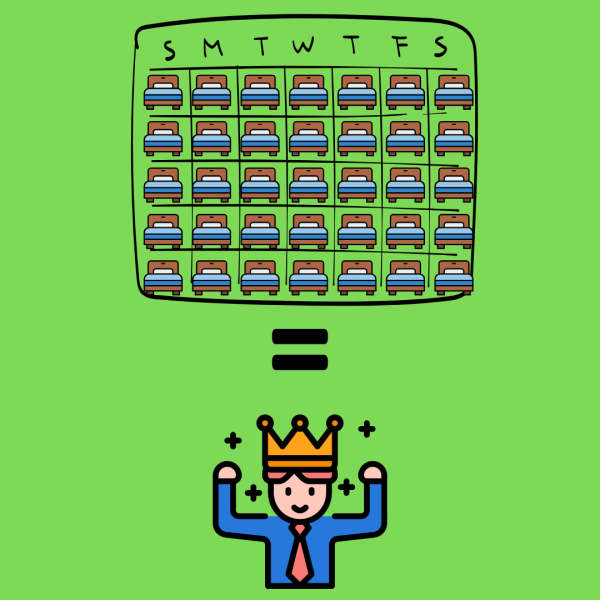
Many of the best self-help books highlight the power of starting with one small positive habit. It may feel unimportant at first, but the benefits build up over time. James Clear calls these “Atomic Habits”—and you can’t get much smaller than an atom! Jordan Peterson urges us to “clean your room,” explaining how transforming one small area of your life from chaos to order builds your confidence to confront the other dragons in our lives.
Chapter 1 Summary
This chapter is about beginning each day with a little win—it’s a simple way to set a positive tone and get everything else moving in the right direction.
- The discipline of making your bed: In Navy SEAL training, McRaven had to make his bed perfectly every morning. The creases had to be straight, the blankets tucked tight, and neat enough for a quarter to bounce off. His uniform also had to be starched and spotless, with perfectly polished shoes and a gleaming belt buckle.
- A small win during chaos: In his 37 years in the military, training and combat were often grueling and unpredictable. Making his bed gave him a small sense of control and accomplishment, even when everything else felt chaotic. It’s a reminder that no matter how hard the day might be, you can start with something small, a positive win that is within your control.
In The Power of Habit, journalist Charles Duhigg talks about “keystone habits”—it’s the idea that adopting a small, seemingly unimportant positive habit can create a domino effect in your life, transforming how you approach everything else.
For example, researchers found that people who commit to regular exercise often unconsciously develop other good habits, like eating healthier, smoking less, and even being more productive at work. A keystone habit like exercise improves self-discipline and decision-making, which carries over into all areas of our lives.
🤝 2. Lean on Others: Success depends on teamwork, both in life and war. Whether you’re carrying a rubber boat in SEAL training or raising a family.
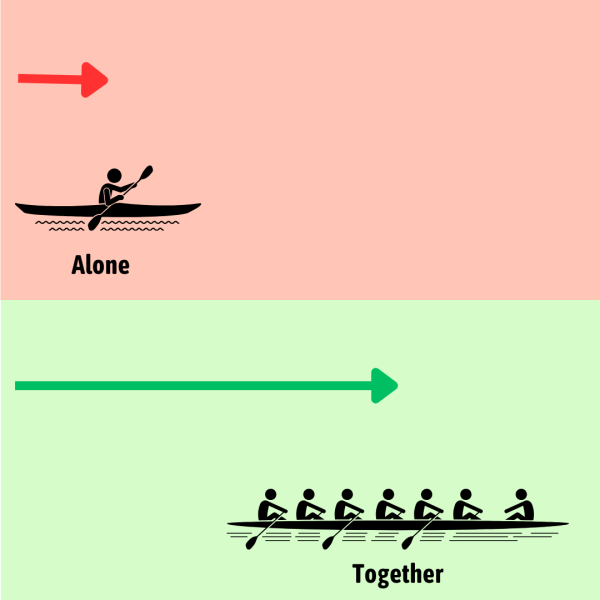
Steve Jobs, co-founder of Apple, was a famously intense leader with extremely high standards that were often tough for others to meet. He once said, “Great things in business are never done by one person; they’re done by a team of people.” This idea echoes Adam Smith’s insight in The Wealth of Nations: “The division of labour” increases productivity. A team of specialists working together will always outperform an individual trying to do everything alone.
Chapter 2 Summary
This chapter is about how you can’t do it all by yourself—having a team and support from others is what makes the biggest difference.
- Learning the importance of teamwork: During Navy SEAL training, McRaven and six teammates carried a heavy rubber boat everywhere. If one person was sick or injured, the rest stepped up, knowing that someday they’d need the same support. Life is like carrying that boat—you can’t do it alone. Build strong connections with friends, family, and a partner, because they’ll be there to help when challenges inevitably arise.
- A near-fatal accident proves the value of support: 25 years later, as a high-ranking Navy captain, McRaven had a parachuting accident, colliding with another jumper’s parachute at 120 miles per hour. The crash tore apart his stomach muscles, required surgery with titanium plates and screws, and left him bedridden for 2 months. During this time his wife, Georgeann, became his nurse and biggest supporter, pushing him to never give up. Throughout his life, McRaven succeeded because others believed in him and were willing to take a risk to help him move forward.
Chapter 3 Summary
This chapter shows that determination and grit matter more than your size or appearance.
- Strength isn’t about size: During SEAL training, McRaven stood next to a 5’4” man as huge waves crashed on the shore. The 6-foot-tall instructor mocked him, saying the waves would break him. The man confidently replied, “I won’t give up.” By the end of a grueling swim, he was near the front of the group, proving that toughness isn’t about physical size—it’s about inner strength. Much of SEAL training is about proving doubters wrong by showing what you’re capable of.
- Don’t judge by appearances: Before starting SEAL training, McRaven saw a thin, frail-looking man at the training building and assumed he would be easily rejected by the SEALs, who must fight in brutal conditions like jungle and deep mud. That man turned out to be Tom Norris, a Medal of Honor recipient who rescued airmen behind enemy lines in Vietnam and later joined the FBI’s first hostage rescue team. Norris is another example proving that heart and determination matter far more than physical traits.
💪 3. Push Through Failure: In SEAL training, failing meant extra punishment. Many quit, but those who endured grew stronger. Failure is a chance to improve.
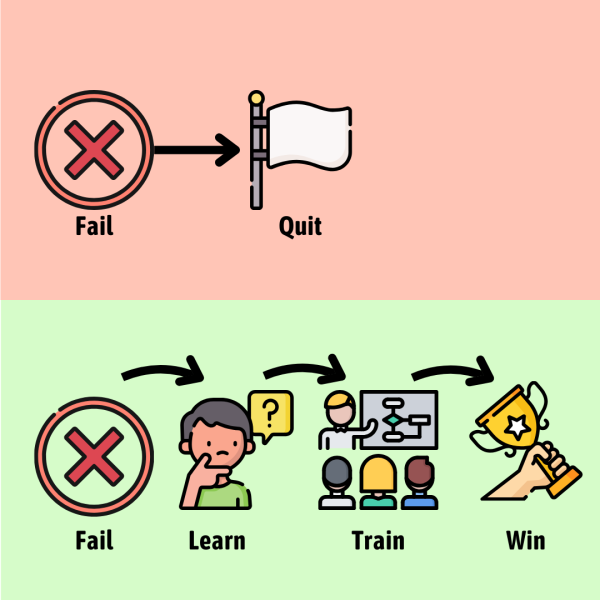
The philosophy of Stoicism offers powerful mental tools for dealing with life’s uncertainties. It teaches that some things are within our control, like our thoughts and actions, while others—like other people’s behavior or the weather—are not. Strength and peace of mind come from focusing on what we can change and accepting what we cannot.
Chapter 4 Summary
This chapter is about accepting that life isn’t fair and choosing to keep moving forward anyway.
- The “sugar cookie” lesson: During SEAL training, McRaven was punished by being made a “sugar cookie.” He had to sprint into the ocean fully clothed, then roll in the sand until he was completely covered. Then he had to spend all day uncomfortably covered in sand. There was no reason for the punishment other than to teach him a hard truth: life isn’t always fair. Even when you do everything right, unfair things can still happen, and you have to keep going. This was difficult for many SEAL trainees to accept, as they expected to be rewarded for their effort.
- How great people handle unfairness: A year later, McRaven’s SEAL instructor, Lieutenant Moki Martin, was seriously injured in a cycling accident. Overnight, he went from being an outstanding athlete to being paralyzed from the waist down. Instead of feeling sorry for himself, Moki focused on what he could do—raising his daughter and organizing SEAL triathlons. He showed that greatness isn’t about avoiding challenges but how you face life’s hardness, as demonstrated by famous figures such as Nelson Mandela and Helen Keller.
Man’s Search for Meaning by Viktor E. Frankl is based on his experiences as a Holocaust survivor. Frankl, a Jewish psychiatrist, was imprisoned in Nazi concentration camps, where he lost his parents, wife, and brother.
During that unimaginable tragedy, Frankl noticed that some prisoners found the strength to keep going by finding meaning—whether it was a child waiting for them, important work they hoped to return to, or enduring suffering with dignity. Those who couldn’t find meaning often lost their will to live.
As Frankl wrote, “Everything can be taken from a man but one thing: the last of the human freedoms—to choose one’s attitude in any given set of circumstances, to choose one’s own way.”
Chapter 5 Summary
This chapter is about how failure can be an opportunity to learn and grow stronger—if you refuse to give up.
- Failure leads to improvement: During SEAL training, McRaven and his swim buddy, Marc Thomas, came in last during a swim and were punished with “The Circus”—two extra hours of brutal physical training. The Circus was dreaded for leaving trainees too exhausted to perform well the next day, creating a cycle of punishment that caused many to drop out. But McRaven and Thomas kept going. After enduring multiple Circus sessions, their swimming improved so much that they finished their final 5-mile swim in first place, earning praise from their instructors.
- Bouncing back from career failure: Years later, McRaven was removed from his SEAL squadron for trying to change procedures his bosses didn’t agree with. With a damaged reputation, he could have given up, but instead, he took an assignment at a small outpost, leading a team of 12 men. By working hard and giving his best every day, he earned back respect as a leader. Over time, he rose through the ranks again, leading major missions during the Iraq War, saving hostages, capturing pirates, and eventually becoming a four-star admiral. Everyone fails, but what matters most is how you respond—keep going and don’t let setbacks define you.
🦈 4. Face Your Fears: Courage becomes stronger with practice. Whether tackling a tough challenge, standing up to a bully, or swimming through shark-infested waters at night.

This next part of the book is actually quite close to the science-based approach. You see, Cognitive Behavioral Therapy (CBT) is considered the “gold standard” treatment for anxiety disorders. It has two main parts:
- The cognitive part focuses on how our thoughts create our emotions. By recognizing and challenging negative thoughts, we can change how we feel.
- The behavioral part involves facing fears through exposure therapy. This means gradually confronting what scares you, step by step, in a safe and controlled way. Over time, you realize that the fear wasn’t as bad as you thought, replacing anxiety and avoidance with confidence.
Chapter 6 Summary
This chapter is about taking smart risks to reach your full potential.
- Taking risks to improve: During SEAL training, McRaven struggled with the “Slide for Life” obstacle, a 30-foot-high tower with a rope leading to the ground. At first, he played it safe, inching down slowly while hanging underneath the rope. A veteran instructor told him he’d never succeed without taking risks. Letting go of his fear, McRaven tried sliding headfirst and nailed it, earning the instructor’s respect.
- Daring in the field: While in Iraq, McRaven approved a daring daytime mission to rescue three hostages. The plan involved landing directly in the compound, which carried high risks. Despite one helicopter clipping a wall, the mission was a success, and all three hostages were saved. Inspired by the British Special Air Service motto, “Who dares wins,” McRaven believes that calculated risks are necessary to push your limits and find out what you’re capable of achieving.
Chapter 7 Summary
This chapter highlights the importance of showing courage when confronting bullies and tyrants.
- Facing fears to achieve a goal: During SEAL training, McRaven had to swim four miles at night in shark-infested waters. The fear of great white sharks was overwhelming, but the goal of becoming a SEAL—a mission he saw as noble and worth the risk—gave him the courage to keep going. Instructors taught that if a shark circles you, never show fear or swim away; instead, stand your ground and punch it in the nose with all your strength.
- Standing up to real bullies: After Saddam Hussein, known as the “Butcher of Baghdad,” was captured, McRaven noticed how his arrogance and intimidation still scared Iraq’s new leaders, even behind bars. Over time, they gained the courage to stand up to him, and Saddam was executed a year later. McRaven’s key lesson: bullies and tyrants look for weakness, and it takes courage to face them head-on to prevent them from dominating others.
Chapter 8 Summary
This chapter is about being your best when life feels darkest to provide strength for others.
- Facing challenges in complete darkness: During SEAL training, McRaven completed a 2-kilometer underwater mission to plant a dummy mine on a ship in San Diego Bay. He and the other trainees swam in near-total darkness, guided only by a compass lit by a dim green light. Underneath the ship, where it was pitch black, he had to stay calm and focused to avoid getting lost. The takeaway: When life is at its darkest, you need to remain strong amidst fear and uncertainty.
- Strength in the darkest moments: In Iraq and Afghanistan, McRaven attended many ramp ceremonies honoring fallen soldiers. These solemn events began with troops forming two lines along the open ramp of a C-17 aircraft. A Humvee slowly brought the flag-draped coffin to the plane while a small band played “Amazing Grace.” Despite the overwhelming grief, those present stood tall, showing immense dignity, strength, and courage to honor their fallen comrades.
As we’ve heard, Navy SEAL training pushes recruits to their physical and mental limits. For an even more intense story, look into David Goggins. Goggins was 106 pounds overweight, unhappy in his marriage, and working as an exterminator of rats and cockroaches.
One day he was chugging a chocolate shake on the sofa and he saw an inspirational military ad that made him decide to try out for the Navy SEALs. At first, he could barely run for a minute, but he slowly got used to the pain of exercise. He began eating more veggies and losing the weight.
Eventually, he became a Navy SEAL, ran 100+ mile ultramarathons, and achieved a pull-up world record. His secret? Goggins says, “You have to build calluses on your brain just like how you build calluses on your hands. Callus your mind through pain and suffering.”
🌟 5. Inspire Hope: Showing strength gives others the courage to keep going, whether you’re a soldier singing in freezing mud or a civilian consoling a grieving family member.

We find strength in others—family, friends, or community—and this is backed by science. One of the most fascinating books I’ve ever read is The Body Keeps the Score, where Dr. Bessel van der Kolk highlights the healing power of united action, like singing, chanting, or moving together. Whether recovering from trauma like war or a painful childhood, people heal and grow stronger through shared actions. This may explain why religious services, with their collective rituals, are so deeply therapeutic and empowering.
Chapter 9 Summary
This chapter is about the power of hope and showing others that things can get better.
- Hope in the mud: During Hell Week, the hardest part of SEAL training, McRaven and his group spent hours neck-deep in freezing mud after days of nonstop punishment. A trainer offered hot coffee and soup if five people quit. One trainee stood to leave, but another began singing in a weak, raspy voice. The singing spread, lifting everyone’s spirits, and the trainee returned to the mud. Together, they endured, showing how hope can give people strength to keep going.
- Hope in deep grief: After a helicopter crash killed 38 men during the War on Terror, McRaven met with grieving families, unsure if his words could help. He watched Lieutenant General John Kelly, who had lost his own son in the war, console the families and make a real difference. By sharing how his own family survived their pain and carried on, Kelly gave others hope that they, too, could endure and find better days ahead.
Chapter 10 Summary
This chapter is about refusing to give up, no matter how tough life gets.
- The lesson from SEAL training: On the first day of SEAL training, an instructor told 150 new trainees that their lives would be made as hard as possible for the next six months. But he offered an escape: ring a brass bell three times to quit—no more cold swims, early mornings, or grueling runs. However, he warned that quitting might feel easier in the moment but would lead to a lifetime of regret. Six months later, only 33 SEALs remained. McRaven learned that no matter how tough life gets, you should never ring the bell.
- The resilience of a young Ranger: Adam Bates, a 19-year-old Army Ranger, lost both legs after stepping on a mine. In the hospital, severely injured and with tubes in his chest, he signed “I will be okay” to McRaven. A year later, McRaven saw the young soldier again at a military event, standing on prosthetic legs, laughing, and even challenging others to pull-up contests. His determination showed that feeling sorry for yourself doesn’t make life better—resilience and strength do. Even in the hardest times, someone else is pushing through tougher challenges. So can you.
- Make your bed daily: Start your day with this simple win to build discipline and control.
- Set one goal each morning: Write down the most important thing to accomplish and focus on completing it.
- Reach out to someone today: Call or text a friend, colleague, or mentor for advice or support.
- Delegate one task: Trust someone else with a responsibility you usually handle alone, whether at work or home.
- Write down your “why”: On a sticky note, list your reason for pursuing your goal and keep it visible.
- Take one step forward: When overwhelmed, pick one small action you can do right now to keep moving.
- Reflect on a failure: Write down one recent failure and list what you learned from it.
- Try again immediately: Take one action today to improve on something you previously struggled with.
- Encourage someone today: Compliment or support someone facing a challenge to lift their spirits.
- Model resilience: Stay calm and solution-focused in a stressful situation to lead by example.

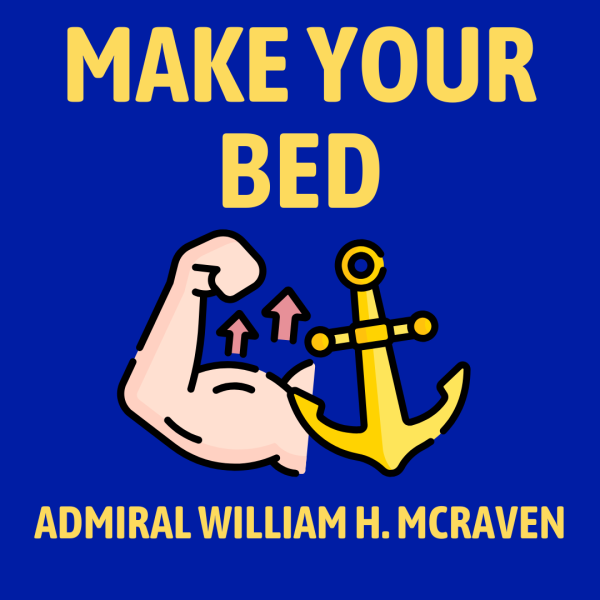















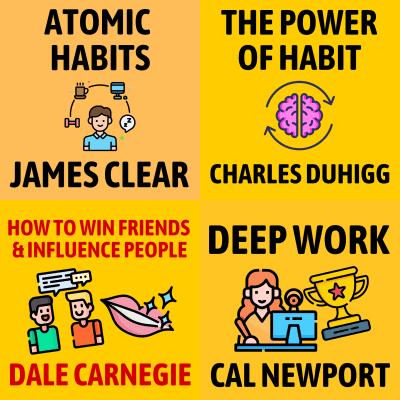













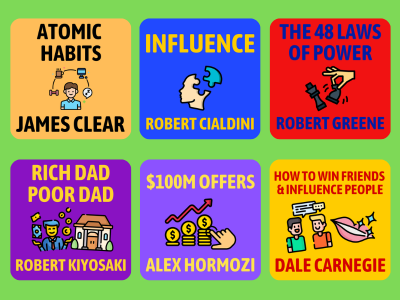
Community Notes